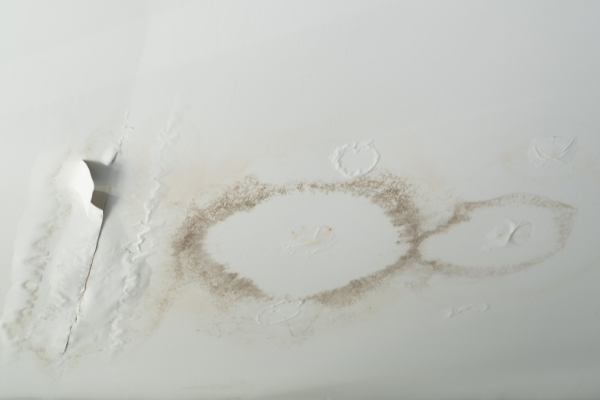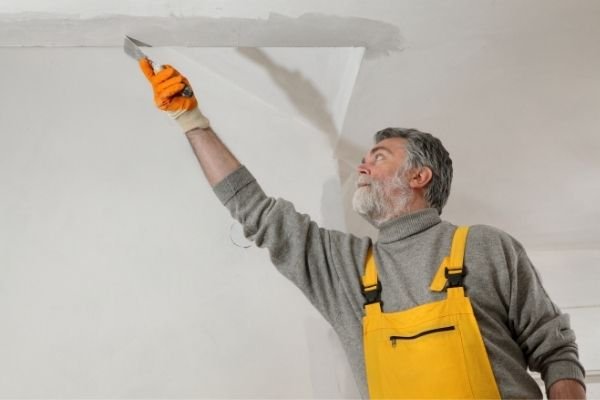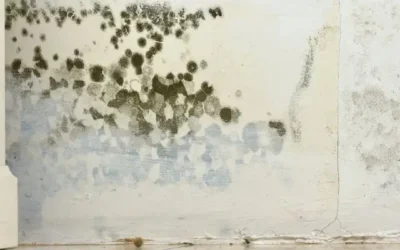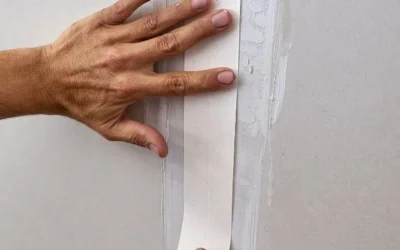
Signs that your ceiling is leaking
If it’s a small leak it can be tricky to notice it at first. You might see come faint discoloration on the ceiling or perhaps mould growing in section of the ceiling. You may notice some dampness in the ceiling or on adjoining walls. There might even be bubbling on the wall paint.
If it’s a larger leak it should be fairly obvious with water dripping from the ceiling. If this is the case, then it’s best to do what you can to minimise the damage as quickly as you can. Find a bucket of water to catch the dripping water to prevent it soaking into your floor.
Leaks are not always easy to find
The source of the leak may not be the location where the water is dripping through the ceiling. Rainwater may flow down a rafter or a beam on a sloping section of your roof before dripping onto the section of ceiling which is being affected. A similar phenomenon can also be observed with water coming from a burst or leaking pipe.

Plumbing issue or roof leak?
If the water damaged section of the ceiling is clean and the water dripping into the bucket looks fairly clean it indicates that the leak may be caused by a plumbing issue. Dirty water and heavy discolouration on the ceiling indicate that a compromised roof is at the root cause of the issue. This is because as rainwater runs down the roof it collects dirt and other debris.
Steps to follow if your ceiling is leaking:
1. Try and minimise damage
If safe to do so place buckets and towels under the section of the ceiling which is leaking to prevent it from causing further damage to the flooring in your home. Where practical remove furniture and belongings from the room in which the leak is occurring. Avoid standing directly under the leak as water can compromise the strength and integrity of the gyprock ceiling.

2. Place a tarpaulin on the roof
If for some reason you cannot get the leak addressed promptly, and you are certain the leak is coming from damage on your home’s roof, then after the rain has stopped and the roof is dry, secure a tarpaulin over the section of roof which has been damaged.
3. Take photos to document damage
Proper documentation is crucial for making a home insurance claim. Take notes of the events that occurred and when. Take photos of not only the damage to the building but also photos of any furniture, bedding, electronics, and other personal items that have been damaged.
4. Contact your insurance company
Many home insurers have their select partner roofing, plumbing and construction companies they deal with exclusively for all home insurance claims. If you don’t know what your home insurance policy states, then contact your insurance company to see what their policies are regarding getting the repair work done on your ceiling and or roof. If the leak is severe and you don’t mind footing the bill, then you can try calling a 24 hour plumber to get an instant resolution to the problem.

5. Hire a plumber
If you don’t have home insurance or your insurance provider lets you choose the contractor to repair the damage, then you can start calling around an organising to get a roof plumber to come to your property. Plumbers have sophisticated equipment and tools to help them identify exactly where the water is coming from and resolve the problem. If the leak is coming from substantial damage on your properties roof you may need to contact a roofing contractor to replace sections of the damaged roof.
6. Hire a plasterer
Once the root cause of the water damage has been adequately addressed almost certainly will you need to get a plasterer in to repair the water damaged ceiling, and perhaps the adjoining walls. Make sure you get a plasterer experienced in repairing water damaged ceilings as many plasterers focus on new builds and renovations and have limited repair experience. At the end of the day, you want the repair work to blend in seamlessly with the remainder of the ceiling with no trace that the damage even occurred.
Check out this article which describes how to choose the best plasterer.

7. Hire a painter
Once the ceiling is sound then the last step in the repair process is to get a painter in to paint over the new gyprock ceiling. It might be tricky for the painter to exactly colour match the repair work with your existing room, especially if you the room hasn’t been painted in a long time and you don’t have any leftover paint. If this is the case, you may want to use this opportunity to renovate.
Fix your leaky ceiling
Ceiling leaks can be severe and cause untold damage in a matter of minutes or they can be seemingly small and insignificant. Either way it’s best to address the issue as soon as it arises. Leaving it alone and hoping it will go away is not a wise move. Time and increased exposure to water will only cause the remedial work to be more extensive and costly. As soon as you notice your leaky ceiling then make sure to promptly follow the steps outlined above.
Looking for an affordable plasterer?
Contact Paul for a free quote on your renovation or repair project. With 15 years experience, fully licensed and insured you’ve got nothing to lose by getting a quote




